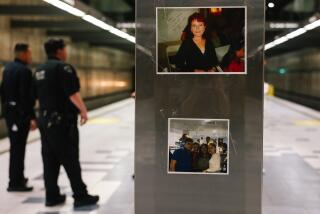Trucking, passenger train industries still have a tough road ahead when it comes to security
- Share via
The nation’s trucks and railroads, threading their way across bridges and through tunnels into every neighborhood in the land, offer almost limitless possibilities for terrorist attacks. The pipelines, chemical plants and fuel storage yards dotting the landscape offer additional targets.
Only the barest beginning has been made to safeguard this.
Amtrak now requires passengers to show photo IDs when they buy tickets; those using credit cards in ticket machines have their names checked against FBI databases.
Boarding passengers are not screened, however. There’s no systematic check for explosives. And it’s impossible to be sure a passenger who lugs a heavy bag onto a train even stays aboard.
The situation is a little brighter for rail freight. The Assn. of American Railroads, which represents freight lines and Amtrak, has created a 24/7 center to monitor security. The railroads have also increased tracking of hazardous materials and munition shipments and compared the list of their employees against the FBI watch list.
Both physical and computer security have been bolstered, as they have for the nation’s 2.2 million miles of privately operated natural gas and petroleum pipelines. One pipeline company moved its control facility from an office building with a public underground garage to a location in the woods.
Then there is the intractable problem posed by the estimated 7.8 million commercial trucks and 500,000-plus interstate trucking companies, nearly 39,000 of which ship hazardous materials. The government is trying to lay the groundwork for “safe shipper” systems that would rely on companies to screen workers and guard cargoes.
More to Read
Sign up for Essential California
The most important California stories and recommendations in your inbox every morning.
You may occasionally receive promotional content from the Los Angeles Times.













